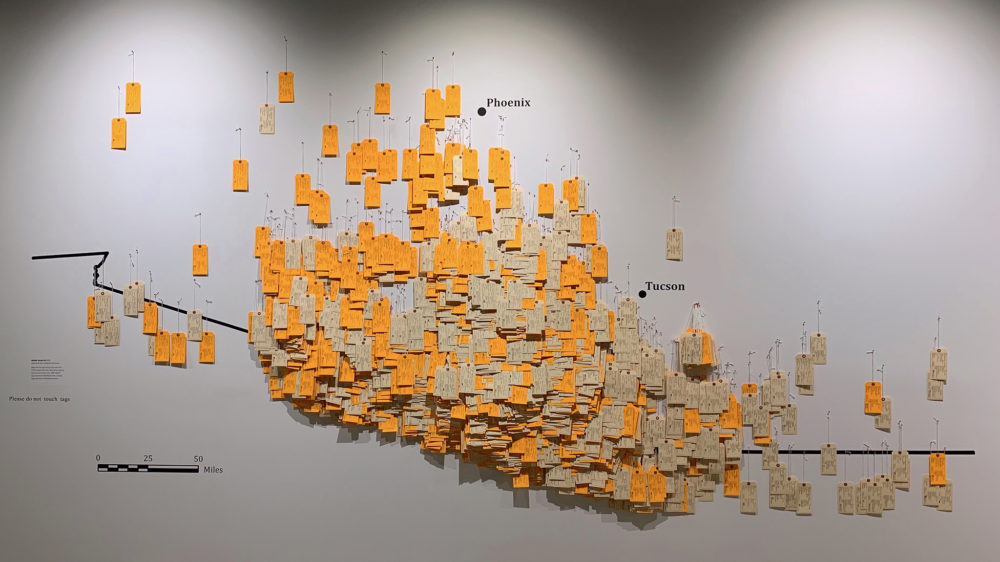Anthropologist Sheds Light on Politics of Migrant Life and Death
Jason De León brings work of Undocumented Migration Project to campus for Sept. 30 discussion
Jason De León will share his experiences as executive director of the Undocumented Migration Project, a nonprofit research-art-education-media collective, in a Thursday (Sept. 30) lecture at the University of Mississippi.
“The Land of Open Graves: Understanding the Current Politics of Migrant Life and Death along the U.S.-Mexico Border,” is set for 4 p.m. in the David H. Nutt Auditorium, at 542 University Ave. The event is free and open to the public.
“We are lucky to have Dr. De León come to campus,” said Simone Delerme, McMullan Associate Professor of Southern Studies and Anthropology. “Our students have read about what’s happening at the border and now they can hear the stories firsthand, including what he’s working on now.
“He’s telling stories about migrants, and many of us have migration stories in our own families and ancestors that migrated.”
Since the mid-1990s, the U.S. federal government has relied on a border enforcement strategy known as “prevention through deterrence.”
Using various security infrastructure and surveillance techniques, this strategy funnels undocumented migrants toward remote, rugged terrain such as the Sonoran Desert of Arizona with the hope that extreme temperatures and other natural obstacles will deter people from unauthorized entry. Hundreds of people die annually while undertaking this dangerous trek.
Since 2009, De León’s Undocumented Migration Project, which is committed to raising awareness about the global migration crisis while working to inspire empathy, positive social change and immigration reform, has used a combination of forensic, archaeological and ethnographic approaches to understand the various forms of violence that characterize the social process of clandestine migration.
De León’s lecture will focus on what happens to the bodies of migrants who die in the desert. He argues that the way that bodies decompose in this environment is a form of hidden political violence that has deep ideological roots, and he demonstrates how the postmortem destruction of migrant corpses creates devastating forms of long-lasting trauma.
This lecture is part of the Movement and Migration/Future of the South Initiative, launched by Delerme and Carolyn Freiwald, UM associate professor of anthropology, in 2019.

An accompanying exhibit, “Hostile Terrain 94,” will be on display in Lamar Hall beginning Oct. 15. “HT 94” is a participatory exhibition created by the Undocumented Migration Project and composed of some 3,400 handwritten toe tags, representing migrants who have died trying to cross the Sonoran Desert from the mid-1990s to 2020.
“Carolyn and I selected this exhibit, which is taking place at over 120 institutions across six continents, because it raises awareness about the humanitarian crisis at America’s southern border and allows students to engage in conversations about migration,” Delerme said.
These tags are geolocated on a large wall map of the Arizona-Mexico border, showing the exact locations where human remains were found. The physical act of writing out the names and information for the dead invites the LOU community to reflect, witness and stand in solidarity with those who have lost their lives in search of a better one.
The construction of “HT94” will be made possible by teams of volunteers from the university who participate in tag-filling workshops, where they write the details of the dead and then publicly place the tags on the map in the exact location where each individual’s remains were found.
Some tags also contain QR codes that link to content related to migrant stories and visuals connected to immigration, including a virtual exhibition that can be accessed via cellphone.
“People often think about a ‘migrant’ as someone different, someone they have nothing in common with, an individual from somewhere else in the world,” Freiwald said. “However, many of us have migrants somewhere in our family tree, whether it’s a distant ancestor or someone we know and love.
“It’s important to understand what’s happening to migrants today, so we decided to bring this event to campus for our students.”
De León is a professor of anthropology and Chicana, Chicano and Central American studies at UCLA. He is executive director of the Undocumented Migration Project, a research-arts-education collective that seeks to document and raise awareness about the experiences of clandestine migrants, and president of the board of directors for the Colibri Center for Human Rights, a nonprofit organization that seeks to identify and repatriate the remains of people who have died while migrating through the Sonoran Desert.
He also is author of the award-winning book “The Land of Open Graves: Living and Dying on the Migrant Trail” (University of California Press, 2015) and a 2017 MacArthur Fellow.
His visit to Ole Miss is co-sponsored by the Center for the Study of Southern Culture, Department of Sociology and Anthropology, Sally McDonnell Barksdale Honors College, Center for Population Studies, McLean Institute for Public Service and Community Engagement, Center for Inclusion and Cross Cultural Engagement and Croft Institute for International Studies.
Written by Rebecca Lauck Cleary
